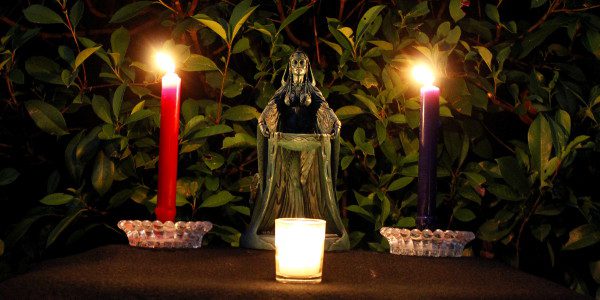When someone asks for suggestions on getting started in Paganism or polytheism, one of the first things I recommend is to begin a devotional practice. It was Step 3 of last week’s 4 Steps to a Deeper Pagan Practice, but the 2+ paragraphs were just enough to give a beginner an idea of what’s involved. In this post I want to go into a little more detail.
If you’re coming from a Protestant or an atheist background, some of these practices may strike you as odd. The Pagan and polytheist movements need a book to help beginners recognize and challenge the unstated assumptions in our wider society and to form a strong Pagan foundation, but as of right now that book doesn’t exist. One is in the works, but there is no timeline for its publication. When I know more I’ll be the first to let you know.
 There is a good book on developing a devotional practice: Devotional Polytheism by Galina Krasskova. Though it is written from a Heathen perspective, the practices it teaches are suitable for most polytheist traditions – devotional “tech” transfers well.
There is a good book on developing a devotional practice: Devotional Polytheism by Galina Krasskova. Though it is written from a Heathen perspective, the practices it teaches are suitable for most polytheist traditions – devotional “tech” transfers well.
There are two issues with this book, neither of which should stop you from using it as a reference. Galina Krasskova is one of the most knowledgeable and devout polytheists I know – she takes her religion, well, religiously. This is a good thing. But her tone can be strident and that can be off-putting for Pagans who are tired of preachers and priests telling them what they have to do (though to be fair, this book strikes me as far less strident than her blog). If her tone bothers you, focus on what she says and not how she says it, and take her at her word when she says “there’s no one right way to do devotion, save respectfully.”
The second issue is that there is so much in the book – virtually every polytheist devotional practice in existence is listed and described. Used as a reference, this is wonderful. Used as a guide, it can lead a beginner to think “do I have to do all that?” and feeling overwhelmed.
Trying to do too much too soon is a recipe for failure. Instead, pick one or two things, learn to do them well, make a habit of doing them regularly, then add additional practices as you’re ready for them. Trust me – the Gods will let you know when They want something more.
While Devotional Polytheism is an excellent reference, it’s not scripture and neither it nor any other book is necessary to start a devotional practice. What is necessary to start is to start. So get started.
Choose a deity. Usually this is easier than it sounds. Most times when someone asks me about starting a devotional practice, Someone is already in their life and encouraging them to begin. If there’s more than one, you may be able to honor Them together, or you may need to honor Them separately, particularly if They are associated with different ethnic and cultural traditions. Or you may choose to start with one and add others later. Again, start small and don’t overcommit.
If there’s no God in your life at all, then pick Someone. Pick Someone whose stories intrigue you, whose values match your own, or whose virtues would be helpful in your life. As with our human relationships, our relationships with the Gods can be initiated by either party.
Create an altar. An altar is many things: a place for prayer and meditation, a place for offerings, a mystical center. An altar isn’t the same thing as a shrine, the main difference being that a shrine is a mostly static place of honor while an altar is an active sacred space where work is done.
 Find a space you can dedicate to this purpose. I use a piece of finished plywood on top of a filing cabinet. Others use dresser tops, bookshelves, or cabinets (which can be closed to prevent questions from religiously troublesome visitors). A few have purpose-built furniture or outdoor altars. While humans have a long and noble tradition of creating beautiful religious structures, don’t let the desire for something perfect stop you from creating something useful right now.
Find a space you can dedicate to this purpose. I use a piece of finished plywood on top of a filing cabinet. Others use dresser tops, bookshelves, or cabinets (which can be closed to prevent questions from religiously troublesome visitors). A few have purpose-built furniture or outdoor altars. While humans have a long and noble tradition of creating beautiful religious structures, don’t let the desire for something perfect stop you from creating something useful right now.
What goes on the altar? A representation of the Gods and the items necessary to honor Them. For me, that’s statues, candles, and incense. Don’t forget to leave working space for offerings. If you don’t have a statue, if you can’t afford one, or if can’t find one that strikes you as right, find another representation of the Gods: a picture, a candle, a stone – pretty much anything that helps you connect to Them.
Pray. Speak to the Gods. Ancient prayers are good. So are contemporary prayers written by priests and devotees. So are your own words that express the yearnings of your heart. Calling Them by names, titles, and epithets is good, but remember – They know They’re Gods. You’re the one who needs to be reminded.
Express your admiration and devotion. Give thanks where appropriate. Ask for what you want… but consider Who you’re speaking to. Is your request something important or something trivial? And remember the principle of reciprocity: if you expect to receive, you should expect to give.
Be careful what you offer. If you say “I’ll do whatever you want me to do” They may take you up on it in ways you never considered. My experience has been that the Gods are mostly (but not always) lenient with beginners, but much more strict with those of us who should know better.
Pray respectfully and pray mindfully, but pray.
Meditate. If prayer is speaking to the Gods, meditation is listening for the Gods. Many Pagans learn meditation from Buddhists and the practices they teach are helpful. But emptying your mind is not the aim of polytheist prayer… except to the extent that shutting down the “monkey mind” is helpful in hearing the often-faint voices of the Gods.
Listen… but do not expect to hear with your physical ears. Listen for things popping into your head you had no way of knowing. Look for “coincidences” stacking up. Pay attention to your dreams.
How do you separate the voices of the Gods from your own inner self? At first, that’s hard to do – we aren’t taught how to listen for the Gods as children. Does something tell you what you want to hear? Does it tell you everything is OK just as it is? Does it play on your fears? Does it tell you things would be great if other people would just stop screwing things up? That’s probably you doing the talking.
But if it challenges you to embody the virtues of the Gods, if it pushes you to take on work you know needs to be done, if it calls you to rethink your whole way of looking at the world? That’s probably one or more deities.
For a practice that is part prayer and part meditation, see this post on Pagan Contemplative Prayer by Yvonne Aburrow.
Make offerings. The world runs on reciprocity: “I give so that you may give.” This is true in our relationships with humans and it’s just as true in our relationships with the Gods. Do the Gods really need our offerings? I don’t know. I do know that offerings have been a part of devotion at least since the beginnings of organized religion, a tradition that continues to this day even in Christian churches, both liberal and conservative. Perhaps more importantly, I know the Gods have asked for offerings.
Food and drink are the most common offerings, but sometimes other things are requested or required. Offerings can be formal or informal, so long as they’re offered reverently. And remember: a libation without a prayer is just a spilled drink.
Study. If a person is important to us we want to learn all we can about them. That there is a whole industry built up around the lives of celebrities confirms this point and makes a sad statement about the priorities of our culture. If a God is important to you, learn all you can about Them. Read Their stories, talk to Their priests about their experiences, read mainstream scholarship about the people who first worshipped Them and how they lived. If you’re able, visit sites sacred to Them.

This is easier for some than for others, but there is something out there for almost every deity known to humanity. Look for it, study it, and let it teach you more about Them.
Do devotional reading. Study brings facts. Devotional reading brings experience and wisdom. Read a poem dedicated to your chosen deity. Sing a song to Them. Read a story of someone’s intimate experience of Them. There are several devotional anthologies available, including this one to the Horned Gods. There are more devotional blogs and websites than I can count. The approach and the quality of the writing varies widely, but with a bit of digging you can find something appropriate for you.
Read about Them and let what you read help you to hear Them when They speak to you.
Review and refine. Start small – pick one or two of these practices. After you’ve done it diligently for a couple of weeks, add something else. At regular intervals (maybe every other week at first, then once a month, then once a quarter) review your practice. How’s it going? What’s working well? What’s hard and needs more effort? What’s just not working and needs to be dropped or changed? Make adjustments as necessary.
Mainly, listen. Devotion brings us into closer communion with the Gods. As your practice grows and matures, They will usually let you know what needs to happen next. Sometimes it’s something so simple you wonder why it’s important. Do it anyway. Sometimes it’s something so difficult you wonder how you can ever do it. Do it anyway. Sometimes you don’t hear anything. Keep practicing anyway – divine relationships grow at their own pace.
For another take on devotional practice, see this post by Druid, Witch, and Celtic Reconstructionist Morgan Daimler. It’s dedicated to one Goddess, but the techniques are applicable to most any deity.
There is no substitute for a consistent, reverent, devotional practice. May all your offerings be accepted, and may you grow deeper in your devotion to the Gods.

















